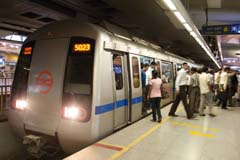The Socioeconomic Impact of Urban Infrastructure: Research Fellow Yamada Talks About Impact Heterogeneity
2016.01.08
"Economic and Social Impacts of Infrastructure Projects: Workshop on Methods and Case Studies" was held in Islamabad, Pakistan, Dec. 14-15, 2015. JICA Research Fellow Eiji Yamada gave a talk on the example of Delhi Metro, India's subway network.
This workshop was sponsored by the Asian Development Bank Institute (ADBI) and Pakistan's Sustainable Development Policy Institute (SDPI). Researchers from the ADBI, the Asian Development Bank, Japan, China, Korea, Malaysia and Pakistan gave presentations, while practitioners from Pakistan, Bangladesh, Bhutan, Myanmar, Moldova, Nepal and Sri Lanka listened.

Delhi Metro, India’s subway network
Yamada's presentation was entitled "Socio-Economic Impact of Urban Infrastructure: Case of Delhi Metro." He pointed out that there has not been much quantitative analysis of the socioeconomic impact of urban infrastructure though evaluations of the econometric impact of rural infrastructure have been accumulating. He also indicated that it is important to focus on distributional impact among different genders and different kinds of people, including castes, as well as the macroeconomic effects on a project's target area as a whole
The Delhi Metro, runs on 190 kilometers of track centered on Delhi, the capital of India. Additional track such as a loop line is being laid. Through such means as the introduction of women-only cars and universal design, and the rule banning waste disposal in the subway, the Delhi Metro has established an image of cleanliness and safety for everyone. JICA has supported the construction of the Delhi Metro since its planning stages and provided the loan for construction. Preparatory analysis using census data suggest that there is a positive relationship between Delhi metro access and women's labor participation, and Yamada talked about these results.
During the question and answer session, there was a question about rationales for focusing on heterogeneity of socio-economic impacts aside from evaluating project's primary objectives (such as relieving congestion in the case of urban transportation). Yamada said impact heterogeneity across social strata is important information when debating complementarity between infrastructure development and other policies. Also, he explained that understanding the mechanisms by which impact heterogeneity emerges can be useful when designing similar projects in the future.

Presenters of the workshop
Presentations were also made on such topics as the income distribution effects of infrastructure in China. The workshop is thought to have raised participants' consciousness of the heterogeneous impact of infrastructure and infrastructure's effects on inclusive growth. One participant commented that it will become more important to verify at the micro level what kind of effects infrastructure has on the daily lives of beneficiaries.

事業事前評価表(地球規模課題対応国際科学技術協力(SATREPS)).国際協力機構 地球環境部 . 防災第一チーム. 1.案件名.国 名: フィリピン共和国.

事業事前評価表(地球規模課題対応国際科学技術協力(SATREPS)).国際協力機構 地球環境部 . 防災第一チーム. 1.案件名.国 名: フィリピン共和国.

事業事前評価表(地球規模課題対応国際科学技術協力(SATREPS)).国際協力機構 地球環境部 . 防災第一チーム. 1.案件名.国 名: フィリピン共和国.

事業事前評価表(地球規模課題対応国際科学技術協力(SATREPS)).国際協力機構 地球環境部 . 防災第一チーム. 1.案件名.国 名: フィリピン共和国.

事業事前評価表(地球規模課題対応国際科学技術協力(SATREPS)).国際協力機構 地球環境部 . 防災第一チーム. 1.案件名.国 名: フィリピン共和国.
scroll